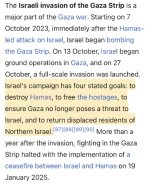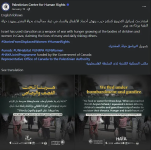Should we ask the obvious?
"Using logic and a current global consensual definition of terrorism do the actions of Smotrich and and his ultranationalist cohorts fit the definition of terrorism?
If they achive their stated goals based on current actions, how will history define the event at the outcome?"
Do we dare?
Oh yes I did.
Definition of Terrorism and Application to Smotrich and Ultranationalist Cohorts
There is no single, universally binding "global consensual definition" of terrorism under international law, as efforts to adopt a comprehensive UN convention have stalled due to disagreements over issues like state vs. non-state actors and distinctions from legitimate resistance.ee4fb882dbab
However, a widely referenced framework emerges from UN Security Council Resolution 1566 (2004), which describes terrorist acts as criminal actions, including those against civilians, committed with the intent to cause death or serious bodily injury, or taking hostages, to provoke a state of terror in the general public, intimidate a population, or compel a government or international organization to do or abstain from doing something, for political, ideological, or similar purposes.4159c84e5c26
This aligns with definitions from bodies like the UN Office on Drugs and Crime (UNODC), which emphasize the "classic terrorist triangle": an attack on one party (e.g., civilians) to coerce or convince another (e.g., a government or population), often involving unlawful violence or threats to advance political aims.18bacedb7013
Key elements include: (1) violence or credible threats thereof; (2) targeting civilians or non-combatants; (3) intent to spread fear or intimidation; and (4) political, religious, or ideological motivation. Definitions often focus on non-state actors, but concepts like "state terrorism" apply when governments sponsor or incite such acts.00970c
europarl.europa.eu
Applying this logically to Bezalel Smotrich (Israel's Finance Minister and leader of the Religious Zionist Party) and his ultranationalist cohorts—such as National Security Minister Itamar Ben-Gvir and other far-right figures in Israel's coalition government—their actions partially fit the definition, particularly in terms of incitement to violence and support for acts that terrorize Palestinian civilians for ideological goals. However, as state officials, their conduct often blurs into state policy, war crimes, or human rights violations rather than "terrorism" in the strict non-state sense, leading to debated classifications.
Violence or Threats and Targeting Civilians: Smotrich and allies have been accused of inciting or enabling settler violence in the West Bank, which includes attacks on Palestinian villages, destruction of property, and assaults causing injury or death—acts described as "terrorism" by critics and some Israeli officials.c9b1c21a950b
For instance, a former head of Israel's Shin Bet security agency labeled Smotrich and Ben-Gvir "terrorists" in 2025, citing their role in escalating such violence.d4dc71
Ben-Gvir has a prior conviction for supporting the Kach party, designated a terrorist organization by Israel and the U.S., and for inciting racism.378ff9
Reports document ultranationalist settlers, emboldened by these figures, conducting "revenge" attacks on Palestinians following incidents like the October 7, 2023, Hamas assault, resulting in deaths and displacement.1a5f8509ebe0
Smotrich's statements, such as calling for Gaza to be "totally destroyed" or "wiped out" as a "terror city," and advocating policies like starving civilians to pressure Hamas, have been interpreted as threats of collective punishment targeting non-combatants.63b7fe
Intent to Intimidate: Their rhetoric and policies aim to coerce Palestinians into submission or emigration, creating fear to advance ultranationalist goals like annexing territories and preventing Palestinian statehood.e9dd239efea1
Smotrich's 2025 plans to "vanquish" Hamas by year's end and potentially "destroy" the Palestinian Authority "like Hamas" frame Palestinians broadly as threats, intimidating communities through implied or actual force.2393db304335
International sanctions in 2025 by countries like Australia, Canada, New Zealand, the UK, and Norway targeted Smotrich and Ben-Gvir for "incitement to terror" and supporting extremist violence, with Slovenia banning them over "genocidal statements."53cdeb37f6f5
Political/Ideological Motivation: Rooted in religious Zionism, their actions promote Jewish sovereignty over biblical lands, denying Palestinian nationhood and viewing displacement as a security or divine imperative.77c71e
This fits the ideological prong, as seen in incitement reports tracking their calls for "total annihilation" or freezing funds over alleged "incitement to terror" by Palestinians.7d0ce1
That said, not all their actions qualify as terrorism:
Governmental policies like fund freezes or military plans against Hamas (designated a terrorist group by many nations) are framed as counter-terrorism, not terrorism itself.2ffa1c6165c5
Critics argue this is a double standard, with op-eds labeling Israel's actions as "terrorism" while sanctioning activists opposing them.e1af05 Logically, while settler violence they enable often meets the criteria (e.g., unlawful attacks on civilians to intimidate), their official roles complicate classification, shifting focus to international humanitarian law violations like incitement to genocide or crimes against humanity.
Historical Definition if Goals Are Achieved
Smotrich's stated goals include "cleansing" Gaza through destruction, "voluntary" emigration of Palestinians, annexation, and eliminating any Palestinian entity, extending similar policies to the West Bank.0aa375
If achieved via current actions—such as military operations, settler expansion, and displacement—history would likely define the outcome as "ethnic cleansing," a term for the systematic, forced removal of ethnic, racial, or religious groups to create homogeneous areas, often through violence, deportation, or intimidation.dbcecbdf9f28d713bb4a6784
This could escalate to "genocide" if involving mass killings, as per the UN Genocide Convention, but ethnic cleansing is distinct yet overlapping, encompassing forced migration without necessarily systematic extermination.374ebce9bc89
Historical parallels include:
Bosnian War (1990s): Serb forces' expulsion of Bosniaks and Croats, termed ethnic cleansing by the UN and later prosecuted as crimes against humanity at the International Criminal Tribunal for the former Yugoslavia; Srebrenica massacre was ruled genocide.6a5b278d69fc
1948 Arab-Israeli War (Nakba): Displacement of ~700,000 Palestinians, debated as ethnic cleansing by historians like Ilan Pappé, though Israel frames it as war-induced flight; remembered as a catastrophe in Palestinian history.309bde
Armenian Genocide (1915): Ottoman forced marches and killings, now widely recognized as genocide but initially downplayed; history defines it as cultural and ethnic erasure.0af1f8
Rwandan Genocide (1994): Hutu-led massacres of Tutsis, defined as genocide by the UN, involving ethnic targeting for elimination.e97c18
In such cases, history—shaped by international courts, scholarship, and narratives—labels outcomes as atrocities, leading to sanctions, reparations demands, and shifts in global consensus (e.g., Holocaust denial laws).941f0a3b30c3
If successful, this event might be termed "the Second Nakba" or "Gaza Ethnic Cleansing," condemned as a crime against humanity, though Israeli narratives could portray it as necessary security measures against terrorism.eab68efb10a6
Outcomes depend on scale, methods, and geopolitical context, but precedents suggest long-term stigma and legal reckonings.

www.polytechnique-insights.com








